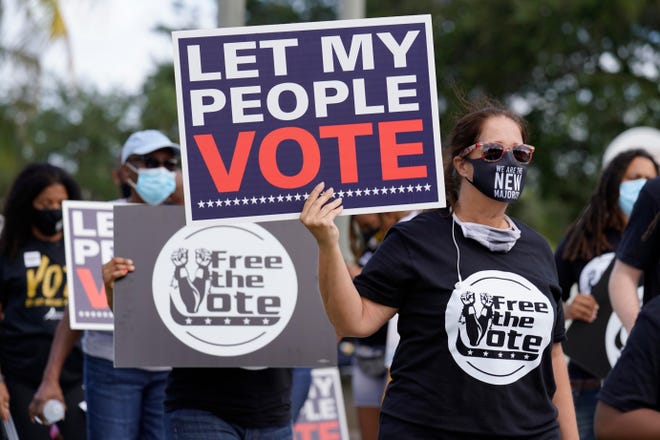
Nicole Lewis and Andrew R. Calderon

Only a fraction of the thousands of formerly incarcerated people whose voting rights were restored in time for the 2020 election made it back on to the voter rolls in four key states – Nevada, Kentucky, Iowa and New Jersey, a Marshall Project analysis found.
At least 13 states have expanded voting rights for people with felony convictions between 2016 and 2020. As a result, millions of formerly incarcerated people across the country are now eligible to vote.
Yet none of the states analyzed registered more than 1 in 4 eligible voters who were formerly incarcerated. That's significantly lower than the registration rate among the general public, where almost 3 in 4 eligible voters registered in each state.
In Kentucky, about 31,000 of the 170,000 people with felony convictions successfully submitted a voting application before the last election. In Nevada, 8,633 of about 37,000 people released from prison in the past 10 years had registered. The state estimates that 77,000 formerly incarcerated became eligible to vote in 2019. In Iowa – the last state with a lifetime ban on voting for people with felony convictions – almost 5,000 of the estimated 45,000 affected people had registered. And in New Jersey, 83 of the roughly 2,000 people released from prison in 2019 made it back onto the voter rolls.

Devyn Roberts, 44, heard about the voting rights changes only after responding to a Marshall Project survey for newly eligible voters in Kentucky. Roberts hasn’t been eligible to vote for most of her adult life, so she hasn’t been following politics closely and didn’t know about Kentucky’s executive order restoring voting rights to some people with felony convictions.
“We are nonvoters,” she said. “They should have told us. There should have been a commercial about this.”
Many people working to register newly eligible voters said the low registration numbers for formerly incarcerated people reflect more than apathy and political alienation. Most don’t even know they now have the right to vote.
None of the states in the analysis required corrections departments or boards of elections to notify newly eligible voters of their rights. The task was left to political organizers, already stretched thin by get-out-the-vote efforts amid a pandemic. To coax the newly enfranchised back onto the voter rolls, they’ve had to dispel the widely held fear that voting could mean going back to prison.
'This is wrong':Iowa's flawed felon list has been disqualifying legitimate voters for years
Organizers are gearing up to apply the lessons of the last election to the politically consequential 2022 midterms. They’re urging corrections officials and probation and parole officers to notify people that their rights have been restored. With the pandemic waning, they’re planning to reach more formerly incarcerated people in person at rallies and in halfway houses across their states.
Many of the officials who oversee the justice system are up for election in the midterms: judges, district attorneys, sheriffs and the county commissioners and state legislators who oversee them.
For Jagada Chambers, who is registering people in Nevada, that means rallying Nevadans with felony convictions to participate in upcoming sheriff and district attorney races. In Kentucky, organizers hope to motivate people to register by the prospect of unseating Republican Sen. Mitch McConnell, who opposes restoring voting rights for people with felony convictions.
If they succeed, the results may not fall along expected party lines: People behind bars are not a monolith, and a survey of their political preferences during the last presidential election showed substantial support for Donald Trump, as well as a range of views on specific criminal justice issues.
Lack of info hobbles voter registration

The full scope of the nationwide push to re-enfranchise the formerly incarcerated is difficult to assess because few states keep track of how many people with felony convictions register to vote.
The Marshall Project requested state voter registration rolls as well as the list of potentially eligible voters in Kentucky, Nevada, Iowa and New Jersey. No such list existed in Nevada and New Jersey, so we obtained information on people who had recently been released from prison.
The corrections department in Nevada provided release information going back 10 years, while New Jersey kept information on releases for only one year. Each state we examined has active voter registration efforts and inexpensive and accessible data. To identify people who had successfully reregistered, we matched names and birthdates in each list. We also texted a survey to people in Kentucky who might be eligible to vote to find out how much they knew about the new voting criteria, and followed up with a handful of respondents.
Similar efforts to quantify voting rights restoration efforts for formerly incarcerated people have also shown low rates of registration. The Miami Herald, Tampa Bay Times and ProPublica reported that only 80,000 of 1.4 million Floridians with felony convictions registered to vote in 2020. Republican lawmakers stymied registration efforts by requiring all fines and fees be paid before registering – sums that were often unaffordable for newly released people. The courts issued more than $1 billion in fines and fees between 2013 and 2018, according to a report by the Florida Court Clerks and Comptrollers.
Those who do register often don’t show up to the polls in large numbers on Election Day, research shows. But the same research also notes that turnout is greater in states that have actively informed formerly incarcerated people about their rights.
Lack of information hobbles registration efforts. None of the states we examined required automatic notification of the newly eligible voters. Because the corrections department and probation and parole offices interact with many of them, those departments could send letters to people in their custody, organizers said, or provide voter registration applications with their orientation paperwork.
“When you get a law passed, the hardest part is getting people to implement it,” said Ron Pierce, who was formerly incarcerated and is now leading registration efforts for the New Jersey Institute for Social Justice. “I had to actually tell my parole officer that he is supposed to be telling people they have the right. He didn’t even know we had the right to vote.”
The New Jersey State Parole Board, Probation Division and Department of Corrections did not respond to repeated requests for comment.
Some states have had success partnering with agencies to spread the word, but progress is uneven.
In Nevada, neither the corrections department nor probation and parole are informing people about the changes in state law. In New Jersey, the probation department keeps track of every conversation about rights restoration and offers a one-hour credit toward community service for people who register and vote. While the Department of Corrections includes information about voting rights in its discharge papers, they come loaded on a CD-ROM, making them virtually inaccessible.

In Kentucky, the Department of Corrections distributes a notification form through probation officers to help people determine their eligibility under the new law. But the forms do not include information about how to register to vote.
A spokesperson for the Kentucky Department of Corrections said it notifies eligible voters upon release from prison, adding, “if they are not eligible for automatic restoration, they are provided a civil rights restoration application and instructions on how to apply.”
A spokesperson for the Nevada Department of Corrections said officials “do not do anything to assist in the voting issue,” but that they were “looking into making it part of the reentry curriculum.” A spokesperson for the Nevada Probation and Parole Division said officials are “indirectly facilitating voter registration” by encouraging “each supervised individual to obtain Nevada identification.” Voter registration is automatic when applying for an ID.
It’s much more common for probation officers to inform people that they’ve lost their voting rights. After Tip Moody got out of jail in 2018, his probation officer informed him he’d have to wait another five years until he could vote.
“I was enraged and totally stunned,” said Moody, who is 61. “To me, voting isn’t just a right. It’s an obligation.”
Moody got lucky. He was released from probation early, so he plans to vote in the coming elections.
One of the most enduring barriers to registering more people is the criminalization of voting for the formerly incarcerated. For decades, a felony conviction has been synonymous with disenfranchisement, so some people are skeptical the laws have actually changed. The fear of being sent back to prison for violating the law is paralyzing. And high profile cases, such as Crystal Mason’s in Texas, reverberate across the country. Mason is appealing a five-year prison sentence for voting while under supervised release.
“I have heard multiple people bring up the case in Texas,” Pierce said. “It just shows just how effective it is even outside of Texas to suppress the vote.”
More:Latest lawsuit to challenge new Florida election law calls it racist
Reaching newly enfranchised voters poses another challenge, since difficulty finding employment and stable housing is one of the most pervasive collateral consequences of a felony conviction.
Chambers, a fellow with Silver State Voices in Nevada, turned to the local news to explain the changes in the law. In Kentucky, Dave Newtonn, an organizer with Kentuckians for the Commonwealth, combed through a list of potential voters provided by the corrections department and texted every viable cell phone number to explain the new rules.
Many of the obstacles to finding and registering formerly incarcerated people stem from the new laws themselves. Several states have confusing eligibility criteria.
In New Jersey and Nevada, anyone no longer in prison is eligible to vote. But in Kentucky and Iowa, people with some felony convictions may not vote, nor can people on probation and parole. In addition, the laws in both states have changed multiple times over the years.
Roberts, who heard about the new voting criteria from the Marshall Project survey, said she wants to vote in the upcoming elections in Kentucky, but isn’t sure she is eligible to register based on the new criteria. One of her convictions is in Missouri.
“I don’t know if one is OK,” Roberts said. “And if you had more than one? Or if you had it in a different state? I read the description, but that’s why I was like, ‘Wait a minute.’”
The Kentucky Department of Corrections set up a website and a call center where people can check their eligibility. Some website searches are “inconclusive,” so people have to follow up over the phone, creating another obstacle for the incarcerated to navigate.

Fragmented data on who is actually eligible also complicates registration efforts. The ACLU in Iowa did receive a list of all potentially eligible people, but the data is so poorly maintained that the Des Moines Police Department was mistakenly listed. So was the mayor of Truro, a small town south of Des Moines.
A spokesperson for the Iowa Secretary of State pointed out that “no comprehensive list” of people with felony convictions exists, and added, “The contact list for Iowans with felony convictions is maintained by the Iowa Department of Corrections, and may or may not have current contact information for those individuals.”
Political alienation is one of the hardest barriers to overcome. When Robert Pate went to prison, he was struck by how many people felt like they weren’t part of society. “[Prison] made them feel like they didn’t have any rights, and it kept a lot of them from wanting or even having the desire to see things change in the community,” said Pate, who has helped register people in Iowa. In each state we surveyed, the work to register newly eligible voters is led by formerly incarcerated people. All know first-hand the stigma that accompanies a felony conviction, which allows them to be more persuasive.

Still, some people with felony convictions, like Nafeesah Goldsmith, question the benefit of voting. Every election season, Goldsmith says she watches as candidates descend on Black churches in New Jersey, promising congregants they’ll fix the roads and improve the schools. But as soon as the election is over, the officials disappear — their promises mostly unfulfilled.
“I am looking at these things and saying to myself: What really have we as a people gained?” she said. Voting, she added, “didn’t do anything for us.”
Goldsmith, who got out of prison in 2015 after 13 years, did not vote in the 2020 election, although she was eligible. She believes direct action — testifying in front of legislators or holding rallies and protests — is a more effective tool.
Midterm elections motivating voting drive efforts
With primaries for the 2022 midterms looming, organizers are working to overcome the obstacles to getting these voters back on the rolls. The midterm elections offer an opportunity to motivate voters to select officials who shape criminal justice in ways that directly affect their lives.
In Nevada, all state senators are up for election, along with the Clark County district attorney and several sheriffs throughout the state. In New Jersey, when people express frustrations about policing, Pierce explains that the mayor picks the police commissioner. In Kentucky, organizers are stirring up support for a constitutional amendment that would enshrine automatic voting rights restoration for people who complete their felony sentence.
Organizers also remind potential voters that felony disenfranchisement laws have limited Black people’s political power. Nationwide, 1 out of every 16 Black adults is disenfranchised because of a felony conviction, a rate that is nearly four times higher than the rest of the population. In Kentucky, 1 out of every 7 Black adults is barred from voting. And in Iowa, as many as 1 in 10 Black adults were barred from voting before the executive order.
Likely voters get the most time and attention from campaigns, said David Danmore, chair of the political science department at the University of Nevada, Las Vegas. Political strategists have tended to avoid areas with high rates of incarceration and, therefore, disenfranchisement. Expanding voting rights for people with felony convictions could change the way politicians campaign.

“These voters are up for grabs,” Danmore said. “But someone has to think it’s worth the time and effort to track these voters down and get them in the pool.”
For Jovan Jackson, the first formerly incarcerated person in Nevada to register to vote under the new law, the impact of decades of disenfranchisement is visible in neighborhoods with high rates of poverty and imprisonment.
Nevada is one of a handful of states that sends people to jail for unpaid traffic tickets, and studies show Black drivers across the state are far more likely than White ones to be pulled over by the police. It’s a cycle that Jackson says has led to more poverty and disenfranchisement.
Ending the criminalization of unpaid traffic tickets is just one of the issues he highlights when encouraging the formerly incarcerated to register to vote. For too long, he says, they haven’t had a say in who would represent them, so their issues weren’t part of the political agenda.
“They didn’t have a voice. They didn’t have a vote,” Jackson said. “Now we can be the voice in our communities. Now we can elect officials that can represent us instead of just neglecting us.”
This article was published in partnership with The Marshall Project, a nonprofit news organization covering the U.S. criminal justice system. Sign up for The Marshall Project’s newsletter, or follow them on Facebook or Twitter.








